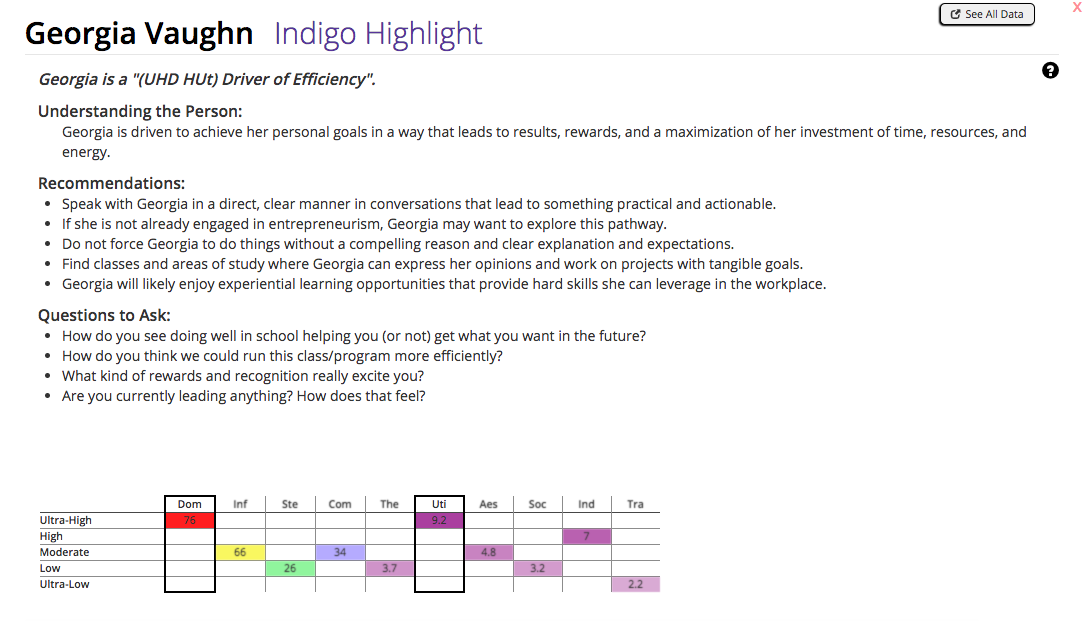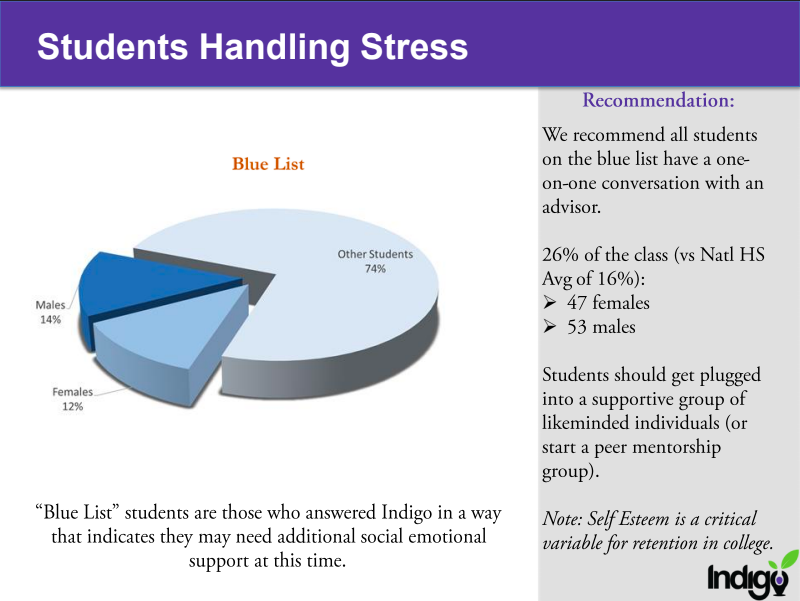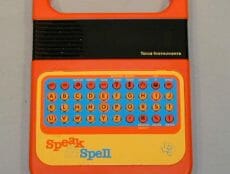Articles
Editor’s Picks
Interviews
K-12
Indigo Believes That, to Personalize Learning, You Need to Start with a Learner’s Personality
By Henry Kronk
October 18, 2018
When one hears ‘AI-delivered personalized learning,’ one immediately thinks of companies using adaptive algorithms to create a one-to-one teaching relationship without the teacher (or, alternatively, current edtech development in China). But one company believes that before you can personalize education, you need to be familiar with the personalities of each student. Indigo offers non-academic assessments of learners using numerous methods recently developed in the fields of psychology and social sciences. Their reports help guidance counselors and teachers tailor education for students and match them with learning experiences in which they will thrive.
eLearning Inside recently hopped on a video conference with Indigo CTO and Strategist for Technology and Growth Initiatives Chris Kalish. “Our designs are non-academic,” he said, “however they are designed to be able to understand the student better to deliver appropriate learning methodologies.”
The Indigo Assessment
Indigo tests learners using four different methods. These are: DISC, which stands for dominance, influencing, steadiness, and conscientiousness; motivation theory developed by Dr. Jack Springer; 21st Century Skills, a widespread trend in current teaching standards; and social emotional learning.
The result is a 45 minute test. “It asks you information about what’s important to you, how you prioritize, what motivates you, an overview of that type of thing,” Kalish said. “Then there are some internal calibrations to make sure that the answers are consistent and so on. Once you complete the survey we produce this summary about the student.”
That summary includes a few notes on the learner’s attributes, some recommendations for their learning strategy, and some questions to ask to target areas where they may struggle.

The volume of data points generated by these assessments would overwhelm anyone without years of clinical experience under their belts. Kalish likens this expertise to a barista who knows how to make the perfect cup of coffee. They can manipulate numerous different variables, like coffee bean, roast style, pressure, and water temperature in order to deliver an expert result. Indigo seeks to deliver the perfect cup of coffee at scale, except the barista is a handful of super-qualified psychologists and the cup of coffee is an accurate student personality assessment.
“My company sought to pull that out of [experts’] heads and identify the methods they go through when looking at the data in order to make those interpretations for guidance counselors. At the end of the day, a perfect barista might make the perfect cup of coffee for a dozen people. We want to make that perfect cup of coffee hundreds of thousands times over. The only way to do that in a scalable way is to take whatever the processes are that go through [psychologists’] heads and then develop a system to automate that.”
And that is what Indigo has done. Their AI-powered system can capture 500,000 different permutations relating to a single individual. And the report condensing these permutations stands as an invaluable asset to anyone invested in the education of this individual.
“The assessment of the student gives the guidance counselor a summary of who that student is, the things that are important to them, some of the concerns that they might run into, and some key questions to ask. Let’s say your high social. One of the questions prompted for the counselor would be, ‘what are the causes that are most important to you?’ Then the counselor understands that they can focus an educational paradigm around that student through that type of motivator. They can say, ‘Oh you’re interested in helping and being able to produce clean energy. Okay, we’ll create a science program around that in terms of clean energy so you can understand photovoltaics, wind energy, so you can understand hydroelectric and all the other things that go hand-in-hand with that. And then they tailor their curriculum based on what motivators are driving them.”
Accounting for Change
There’s no question that everyone changes over time. The Indigo Highlight summaries of a 9th grader would not necessarily apply four years down the line. But some testing methods have a longer reach than others.
“Generally, of the four sciences, the one that’s most stable is DISC,” Kalish said. “If you’re a high dominance individual you’re probably going to be high dominance from freshman year up through junior year. Your personality generally doesn’t change in that fundamental way. If you’re high steadiness–if you’re a person who likes to have all their assignments done online who likes to go over every essay with spell check to make sure it’s perfect–that’s probably not going to change a whole lot. Motivators, however, tend to change based on environment.”
Individuals tend to grow more empathetic and social when they experience tragedy or loss. The influence (or lack thereof) of religion and cultural tradition plays a large role in a student’s personality, as does socioeconomic status, number of siblings, and innumerable other factors. As a result, Indigo normally tests in 9th and 11th grade.
Zooming Out
When entire cohorts and districts get tested by Indigo, things get interesting. “Because we have all the data on all the students interpreted into these four dimensions, we can look at the data in aggregate,” Kalish said. “We have a dashboard and analytics tools which look at statistical variances.”
Guidance counselors and teachers can look at different classes or groups to determine effective teaching strategies. Administrators, even, can look at the entire student body.

“Let’s say you’re a superintendent,” Kalish said. “You can look up all of the aggregated information about your school districts and then look at comparably other school districts with similar demographics and see what are the statistical variances between the two.”
According to Kalish, there is no average district.
“Every school has some differentiator, just like every individual. This is what we call ‘the concept of jaggedness.'” Demographic makeup varies widely based by region. “If you come from Silicon Valley, your school will have a different profile than one in the Midwest or in the Northeast. In every one of the analytics we’ve run so far at the district level, we’ve always been able to see some differentiation from the norm.”
That large, but granular, data set can be used to inform decisions at the district level and beyond. So far, Indigo has administered over 73,000 tests in 147 different districts.
The Non-Profit Arm of Indigo
That data, combined with some other resources, can also be used for development work. Indigo operates both a for-profit and non-profit arm.
“The non-profit is focused on working with developing communities to establish paths to workforce and economic development,” Kalish said. “I’ve been spending quite a bit of time in the past few months working out in San Juan County, Utah. Most of the students there are from the Navajo Nation. San Juan County is a beautiful community in the middle of the Rockies, but there are no [commercial] buildings, there are no office spaces. Last time I was out there, we were talking about how many students have never been in an elevator before. Every building in the community is one-story.”
“That’s a real problem. Where do students go after post secondary school? That’s also a problem if culturally you’re very community-based. The Navajo have a very rich family tradition. They want to stay with their families. But what if there is no business in your family? So that’s why were developing an entrepreneurial curriculum.”
Some of that work consists of a recently completed virtual reality center. It’s set up to allow learners to create things like virtual reality experiences remotely, without needing to leave home. The whole effort, along with Indigo’s other development work, began with a series of personality tests.
Featured Image: RaulAlmu, iStock.









That is it . Use of AI in education is a fantastic project . Congratulations . To develop An English course with AI is a much better project too . Everybody must learn English ,in the world . May be after 10 years I will say everybody must learn Chinese. This portal I have seen now is a fantastic portal for education technology . I am glad I found it by accident . Keep it up .